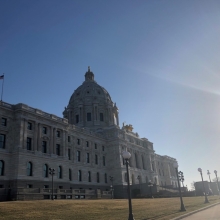Help on the way for Minnesota small businesses and farmers?
With the only divided state legislature in the country, Minnesotans are used to disagreements at the Capitol. Fortunately, Minnesota small businesses and farmers saw hope for agreement on a critical issue: aligning Minnesota’s income tax with the federal Section 179 laws to encourage greater business investment in Minnesota. At the Minnesota Chamber’s Session Priorities dinner, all four House and Senate leaders and Governor Walz expressed openness or predicted that conformity with Section 179 expensing would become law this session.
What is Section 179 conformity?
In 2019, Minnesota conformed to numerous elements of federal law, but did not adopt many of the expensing provisions including Section 179. As a result, Minnesota only allows for a fraction of investments to be immediately expensed, thus putting local small businesses and farmers at a disadvantage. On top of that, Minnesota made some of the business tax changes retroactive, hitting many businesses and farmers with unexpected tax bills. The cumulative impact is extended debt and less money to invest in operations – at a time when Minnesota has a $1.3 billion budget surplus.
Section 179 conformity would:
- Help small businesses and farmers reinvest in Minnesota to help grow our economy.
- Fix retroactive tax increases.
- Improve Minnesota’s competitiveness as most states, including all of our neighbors, have conformed.
- Reduce tax compliance costs and complexity.
- Prevent Minnesota taxpayers from paying more in state taxes than they do on their federal income tax returns.
Legislative response
While this sounds like a great idea for small businesses and farmers, not all great ideas gain traction at the Legislature. Section 179 could be different. At the Minnesota Chamber’s Session Priorities event, all four legislative leaders and Governor Walz either supported or predicted Section 179 conformity by the end of session in May. When asked, “Section 179 in a tax bill, yes or no,” here’s how the legislative leaders responded:
Senate Majority Leader Paul Gazelka: “Definitely.”
House Minority Leader Kurt Daudt: “Definitely, yeah.”
House Speaker Melissa Hortman: “My tax chair would like that.”
Senate Minority Leader Susan Kent provided more of a prediction on its passage: “Yes.”
“I hope so. I think it matters, I think especially in ag country,” said Walz. “It’s been a challenge, it’s been tough. They’re resilient but those are the types of things I think do make sense, expensing equipment purchases…That’s one way we can. I’m certainly open. It’s not a tax bill year but we can walk and chew gum…I think we can certainly bring that up.”
Get involved
Is your business being negatively impacted by Minnesota’s lack of Section 179 conformity? We’d love to hear from you! Contact Beth Kadoun, the Chamber’s Vice President, Tax and Fiscal Policy to share your story and help us pass full conformity this session.
As members of the Invest in Minnesota Coalition, we stand with small businesses and family farms who want nothing more than to invest in the future of their businesses and employees. The Invest in Minnesota Coalition consists of over 70 business and agriculture organizations aligning Minnesota’s income tax with the federal rules to encourage greater business investment in Minnesota.


